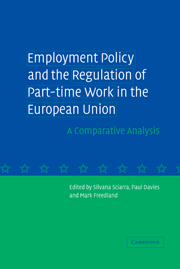Book contents
- Frontmatter
- Contents
- List of figures and tables
- Notes on contributors
- Preface
- List of abbreviations
- PART I
- PART II
- 4 France: part-time work – no longer an employment policy tool
- 5 Germany: part-time work – a bone of contention
- 6 Italy: adaptable employment and private autonomy in the Italian reform of part-time work
- 7 The Netherlands: from atypicality to typicality
- 8 Spain: the difficulty of marrying flexibility with security
- 9 Sweden: part-time work – welfare or unfair?
- 10 The United Kingdom: how is EU governance transformative?
- Index
6 - Italy: adaptable employment and private autonomy in the Italian reform of part-time work
Published online by Cambridge University Press: 30 July 2009
- Frontmatter
- Contents
- List of figures and tables
- Notes on contributors
- Preface
- List of abbreviations
- PART I
- PART II
- 4 France: part-time work – no longer an employment policy tool
- 5 Germany: part-time work – a bone of contention
- 6 Italy: adaptable employment and private autonomy in the Italian reform of part-time work
- 7 The Netherlands: from atypicality to typicality
- 8 Spain: the difficulty of marrying flexibility with security
- 9 Sweden: part-time work – welfare or unfair?
- 10 The United Kingdom: how is EU governance transformative?
- Index
Summary
The ‘eloquent silences’ of the Italian legislation before 1984
When part-time work legislation was first introduced into the Italian system in 1984, adaptable employment, indirect discrimination and the reconciliation of work and family life were still obscure concepts to most Italian labour lawyers. Indeed, even at an institutional level, the major concern of legislators in the 1980s was to provide an initial rudimentary discipline for a type of work that was basically viewed ‘in the negative’, in terms of an atypical deviation from standard forms of employment, which at that time were still mainly represented by full-time, permanent contracts.
Clearly, this is not to say that part-time contracts were considered as illegal before Law No. 863 of 1984 came to regulate them. However, it is unquestionably true that the extremely low rate of part-time work in Italy through the 1970s and the 1980s may not simply be considered as the straightforward result of hindering factors quite commonly found in all European labour markets, such as the social (and trade unions') wariness of the presence of part-time work and an actual entrepreneurial lack of enthusiasm towards it. Rather, it was the overall legislative and contractual context surrounding part-time work that was framed so as to render part-time jobs quite ill-matched with various pre-existing labour law rules which had been deliberated with regard to an ideal-typical employment relationship based on the assumption of permanent and full-time jobs.
- Type
- Chapter
- Information
- Employment Policy and the Regulation of Part-time Work in the European UnionA Comparative Analysis, pp. 156 - 189Publisher: Cambridge University PressPrint publication year: 2004



